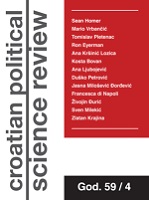Communicative Dimensions of Centre-Periphery Relationships: Communicating the Post-1989 Traumatic Conjuncture in the Balkans and the Future of Europe
Communicative Dimensions of Centre-Periphery Relationships: Communicating the Post-1989 Traumatic Conjuncture in the Balkans and the Future of Europe
Author(s): Zlatan KrajinaSubject(s): Communication studies, Politics and communication, Theory of Communication, Post-War period (1950 - 1989), Migration Studies, Politics and Identity
Published by: Fakultet političkih znanosti u Zagrebu
Keywords: Communication; Identity; Balkans; Europe; Periphery;
Summary/Abstract: This paper surveys the post-1989 Europe/Balkan conjuncture from the perspective of communication studies. I employ David Morley’s materialist definition of communication, encompassing exchange/movement of information/ ideas, goods, and people. Observing the exchange of ideas, we find EU’s Euroscepticism contrasting the Balkans’ Europhilia. Considering the movement of people, the brain-drain from the Balkans is paralleled by incoming migrations and a questioning of whether leaving the region is necessarily advantageous. The movement of goods, finally, elucidates the ascendancy of Chinese investment in the region, confronting Europe with being seen as a periphery of Asia. The materialist communication approach thus reveals unanticipated dynamism (a working-through of inherited inequality), rather than one-way perpetuation of old centre-periphery prejudice. Though historically modelled as Europe’s traumatized inner Other where nationalism was imposed, the Balkans still have much to narrate about impurity of identities and uncertainty as Europe’s new/old possible cultural heritage.
Journal: Politička Misao
- Issue Year: LIX/2022
- Issue No: 04
- Page Range: 251-275
- Page Count: 25
- Language: English

